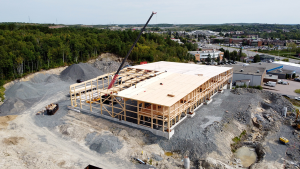National engineering firm RJC Engineers recently opened an office in Halifax and says the $215 million new mass timber manufacturing plant being developed in the area can provide many opportunities for players in the construction industry.
“The local industry and all the jobs it will create and the availability of the products locally, I think there’s some great opportunity there,” said Andrew Bayne, managing principal for Toronto Structural and the overseeing leader of RJC Engineers’ new Halifax office. “We always support local industry and look forward to some collaboration with them once it’s built and up and running.”
Like many businesses, RJC has been working out of Toronto but is finding they are getting more work in Quebec and the Maritime provinces.
“More and more focus has been out in Atlantic Canada where there is opportunity and local growth…so we’re out there more these days,” Bayne said, adding RJC just opened its Halifax office on April 3. “We’ve been servicing the region for 20-plus years but not necessarily had boots on the ground.”
Local industry on board with mass timber opportunities
There has been positive feedback from the local industry, Bayne noted.
“Everybody kind of wants to do it. I think just like every other job, when you start considering something that isn’t locally sourced or available it costs a little bit more, it might hurt pro formas, so the decision-making might be a little bit easier with having locally sourced available product,” he explained.
“They’ll try to create options at the beginning of a project to work through framing and geometries and mass timber is included more and more these days. But whether they make it through that schematic concept level or not really depends on the clients pro formas. There are all sorts of considerations that we walk the client through on how to make those types of choices.”
Without the new local mass timber production, it would have to be sourced from other areas of Canada or overseas.
“I think there are a lot of architects and developers and owners who will jump at the opportunity to start designing now with expectations of having it delivered locally,” noted Bayne. “We’ve been talking to people out there and they’re all very excited about mass timber. Announcements like the new mass timber plant, they get excited about it, so we want to be able to support them.”
It can also help to get affordable housing built quickly.
“Population increases in Halifax, just like any other city across Canada, has its own demands on affordable housing. If mass timber can produce systems that are modular or repetitive enough to make pro formas work on affordable housing or other residential developments then great,” said Bayne. “It’s another tool in the toolbox to deliver a solution for our clients.”
RJC has worked on mass timber projects such as 80 Atlantic, the TRCA headquarters and Centennial College projects in Toronto.
“Each of those projects were sourced in slightly different ways whether it was through Nordic (Structures) out of Quebec or Element5 in southern Ontario or bits and pieces from all sorts of different suppliers,” said Bayne.
“Were quite proud of our leadership on mass timber and the projects that we’ve done and delivered, so we’re really hoping we can collaborate locally on mass timber jobs in Nova Scotia.”
New office allows RJC to expand in Eastern Canada
RJC’s new Halifax office is led by senior project engineer Stephen Mercer. He made a family decision to relocate back to the Maritimes, which created an opportunity for RJC to support a team member and invest in the Halifax market.
“He was eager to get back home, back to his roots and set up shop and actually support RJC in crafting a local office,” said Bayne.
“He’s in the office soliciting the local industry and clients to make sure they’re aware of what we’re doing to help support them.”
In addition to being geographically closer to clients in Atlantic Canada, the goal in opening the new office is to focus on local relationships, support RJC’s people and their families, and contribute to the community and local industry in a meaningful way, Bayne said.
“It’s local clients, local staff, local projects, supporting local industry,” Bayne said. “We’ve been out there for quite some time but it’s a good opportunity and good timing to actually set up formal shop.”
Follow the author on X/Twitter @DCN_Angela.










Recent Comments
comments for this post are closed